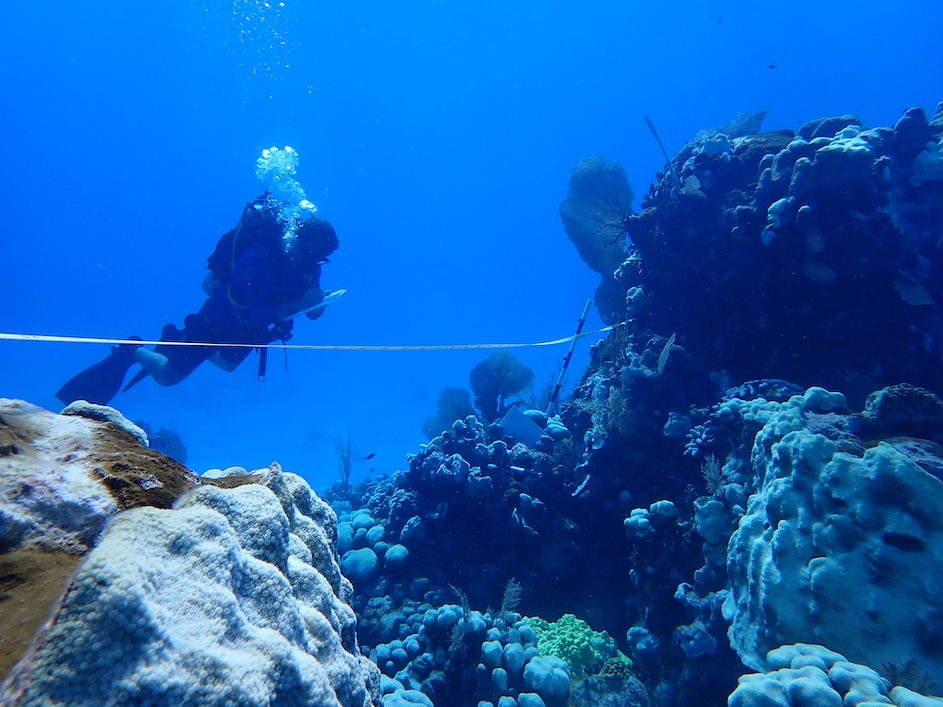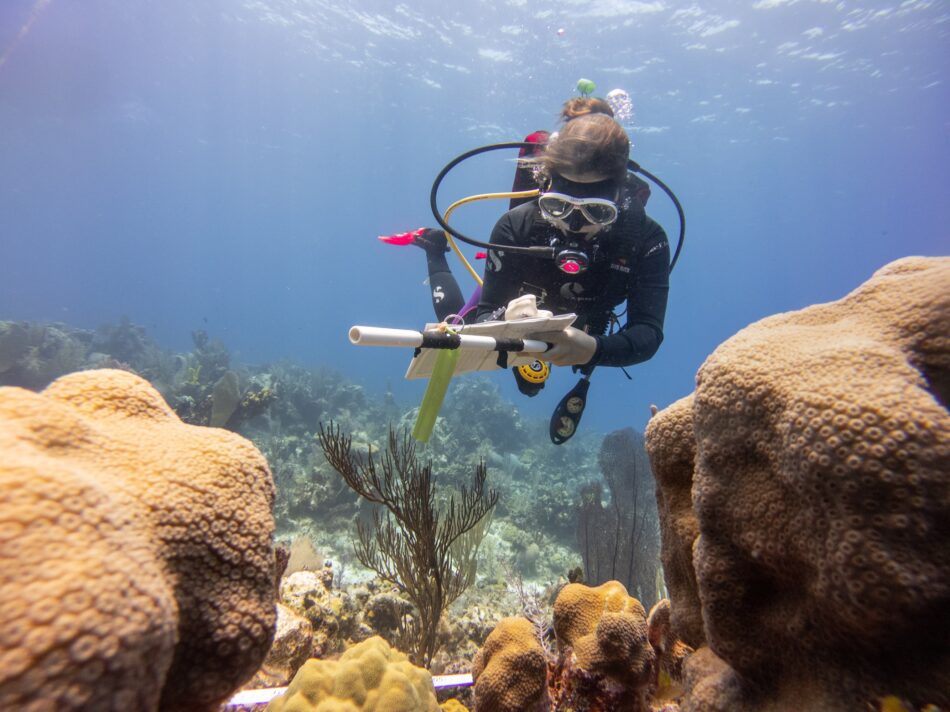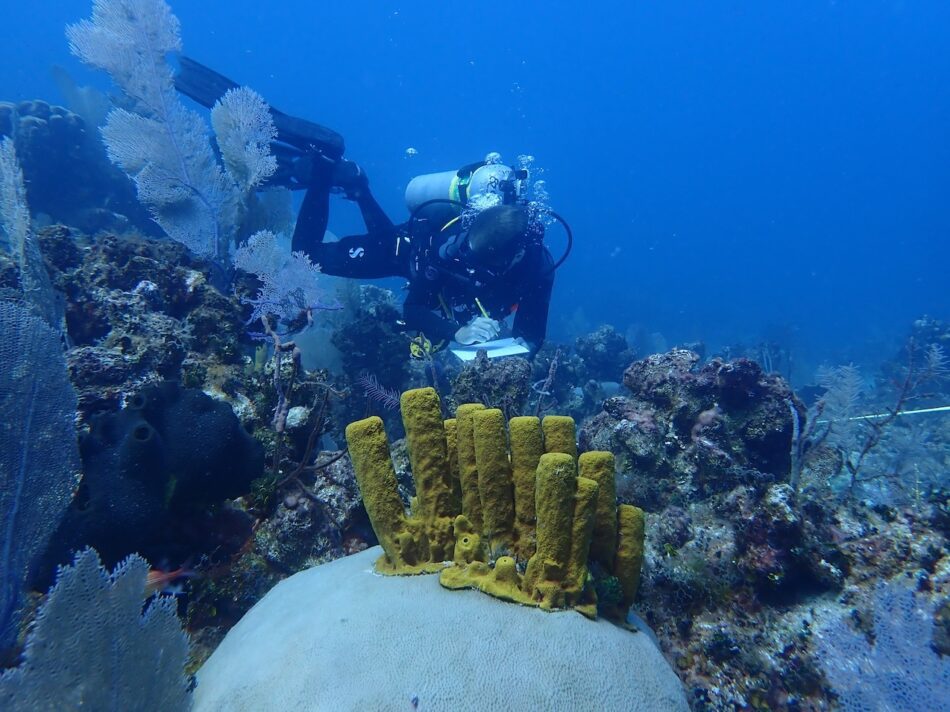The Changing Face of Little Cayman’s Reefs

The summer of 2023 was the hottest on record and brought with it the most extensive global coral bleaching event on record. One year on, how are the historically healthy and resilient coral reefs of Little Cayman faring?

As part of the Healthy Reefs Programme, the Central Caribbean Marine Institute (CCMI) has been monitoring the reefs of Little Cayman for 26 years. This long-term data set allows CCMI’s researchers to understand trends and changes over time and make informed decisions to protect coral reefs. The results of CCMI’s 2024 annual monitoring surveys show the greatest reduction in coral cover recorded through these surveys through the 26-year monitoring period. Although severe, the news is not all bad.
CCMI’s data show that coral cover reduced from 26% in 2023 to 9.8% in 2024 following the mass coral bleaching event. This is the lowest coral cover recorded in CCMI’s surveys since 1999, with a previous all-time low in 2005 of 15%. This extreme decline can be attributed mostly to ‘weedy’ species, that are fast growing, but don’t provide as much of the reef structure as larger, slower-growing boulder corals. These boulder corals, that are key reef-building species, bleached but showed higher rates of recovery and less mortality. The Star Corals (Orbicella and Montastrea) showed a minimal decline between 2023 and 2024.

Overall, what does this mean for the reefs? The loss of weedy species means that overall, the reefs will lose habitat complexity and shelter for marine species and a reduction in reef-building species will result in flatter reefs that provide less coastal protection.
Conversely, fish populations in Little Cayman have thrived in recent years, showing consistent increases since 2016 and dramatic increase in density and biomass in 2024. Large increases were recorded in herbivorous fish, particularly parrotfish, that are crucial for the recovery of the reef ecosystem.
The presence of these herbivorous fish support coral growth and reef recovery through grazing. These fish manage the levels of macro-algae on reefs, which, if left unchecked, can outcompete corals for space on the reef and hinder coral growth.
During the bleaching event, CCMI’s coral nursery severed severe mortality, loosing over 90 corals. However, using genetic information on every individual in the nursery, CCMI’s researchers could identify the specific genetic makeup, or genotype, of fragments that survived the extreme heatwave. Going forward, these findings of genetic resilience will be incorporated into CCMI’s coral restoration programme to increase the chances of success as the impacts of climate change intensity.

In addition to this resilience-based coral restoration programme, CCMI pioneers cutting-edge research to help reefs to survive and adapt to the pressures of climate change. This summer, CCMI explored and mapped the offshore seamount, Pickle Bank. 45 miles offshore this coral reef habitat is relatively undisturbed by human activity and the diverse, healthy reefs found by CCMI researchers provide hope for the future of reefs in Cayman.
Overall, the decrease in coral cover and health following the 2023 mass bleaching event is the most severe since CCMI’s records began. However, this can be attributed mostly to less thermally tolerant, ‘weedy’ species. These species and others similar are fast-growing and can recover faster than boulder-like species.
There is no denying that the face of Little Cayman’s reefs is changing, however there is still hope for the overall function that they provide, and that this functional resilience can persist. The main threat to functional resilience is a phase shift, whereby the ecosystem changes from a coral-dominated to macro-algal dominated habitat. At this point, it is unlikely that the reef would be able to provide the same services, such as habitat provision for fish and coastal protection from storms. The thriving fish populations in Little Cayman, as a result of protections, will help to maintain the reef in a coral-dominated state.
Continued protection, alongside research and active conservation is crucial in conserving this ecosystem at such a vulnerable stage in its history to ensure it can persist through the threats of climate change and continue to adapt and acclimatise to a changing ocean.
For CCMI to continue striving to safeguard marine biodiversity in the face of increasing pressures, the support of corporate sponsors that commit to multi-year funding of these essential efforts is invaluable. CCMI would like to express deepest gratitude to this year’s Healthy Reefs sponsors, Fosters Supermarket, Cayman Island Department of Tourism, Walkers and Knighthead and the Corporate Navigators that make this work possible: Wheaton Precious Metals International Ltd, BDO Cayman, Maples Group, Rawlinson & Hunter, LOM, and Ugland Properties.
Read more about CCMI’s Healthy Reefs Programme here: https://reefresearch.org/what-we-do/research/healthy-reefs/
Watch Dr Gretchen Goodbody-Gringley’s reef lecture on the 2024 Healthy Reefs monitoring results here: https://youtu.be/2V88BSltII4?si=_YKRaPqTPhM3V2IR
Read more about CCMI’s research here: https://reefresearch.org/what-we-do/research/resilience/





